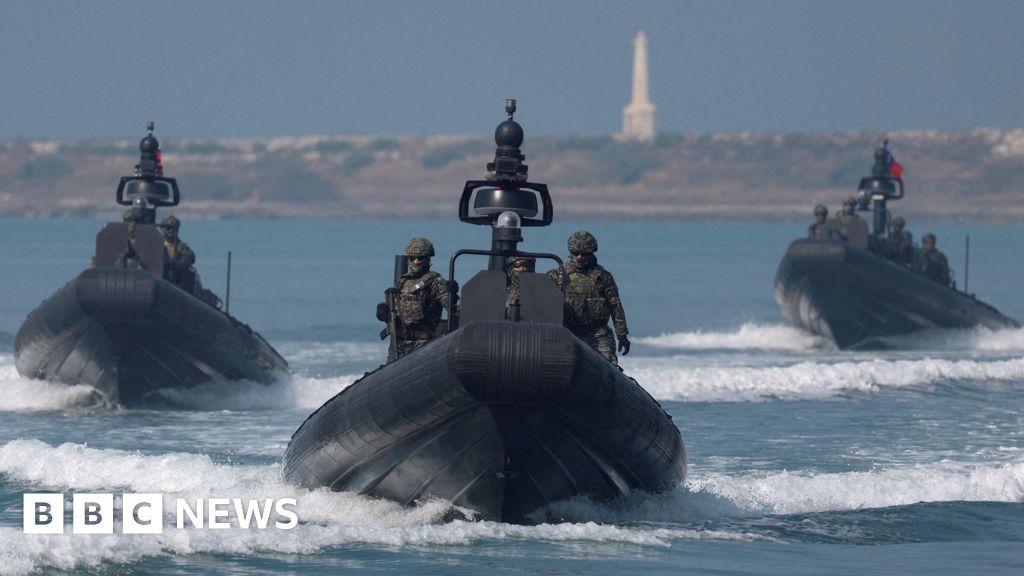Taiwan’s defence ministry has condemned China’s military exercises around the self-ruled island as “irrational provocations”.
The drills come just three days after the inauguration of Taiwanese president William Lai, whom Beijing has labelled as a “separatist” and a “troublemaker”.
They are happening all around the main island, and the Taipei-controlled islands of Kinmen, Matsu, Wuqiu and Dongyin.
A spokesperson for the Chinese People’s Liberation Army (PLA) has called them a “strong punishment” for “separatist acts”.
Taipei has dispatched naval, air, and ground forces to “defend the [island’s] sovereignty”, its defence ministry added.
China’s military said its drills focus on joint sea-air combat-readiness patrols, precision strikes on key targets, and integrated operations inside and outside the island to test the “joint real combat capabilities” of its forces.
Military analysts say Taiwan’s outlying islands close to the Chinese coast have been included as targets for the first time, based on maps released by the PLA.
Taiwanese media cited military expert Chieh Chung saying the ongoing exercise is aimed at “simulating a full-scale armed invasion of Taiwan”.
In August 2022, following a historic visit by then US House Speaker Nancy Pelosi, China carried out its first “encirclement” operation, simulating a blockade of the main island of Taiwan with ships, aircraft and missile strikes. Military incursions into Taiwanese waters and airspace have become a nearly weekly affair since then.
“[Thursday’s drills are] also a strong punishment for the separatist acts of Taiwan independence forces and a stern warning against the interference and provocation by external forces,” the PLA said.
Beijing has labelled Mr Lai a “separatist” and “troublemaker” over remarks he made in the past supporting Taiwanese independence.
China has long claimed self-governed Taiwan as part of its territory – but the island sees itself as distinct.
In his inauguration address last Monday, Mr Lai called on China to “stop threatening Taiwan”.
Beijing denounced the speech, with Foreign Minister Wang Yi describing Mr Lai as “disgraceful”.
After Mr Lai’s election victory last January, Beijing issued a statement insisting that “Taiwan is part of China”. It has also repeatedly rebuffed Mr Lai’s offers for talks.
Taiwan said the drills on Thursday “highlight [Beijing’s] militaristic mentality”.
“In recent years, the continuous harassment by Chinese aircraft and ships has significantly harmed global peace and stability.
This military exercise not only fails to contribute to peace and stability in the Taiwan Strait but also highlights the aggressive militaristic mentality of the Chinese military,” said Taiwan’s defence ministry.
Taiwan’s presidential office has said it is “regrettable” to see China “using unilateral military provocations to threaten Taiwan’s democracy and freedom”.
It added that Taiwan’s military units and national security team have a “comprehensive grasp of the situation”.
“In the face of external challenges and threats, we will continue to defend democracy and are confident and capable of safeguarding national security. We ask the public to rest assured,” it said.
Over the past year, China has repeatedly rehearsed encircling Taiwan with fighter jets and navy ships. In the weeks leading to Mr Lai’s inauguration, Taiwan has reported an uptick in Chinese military incursions.
So far, the manoeuvres have fallen short of an invasion and stayed within a grey zone.
Analysts have told the BBC that grey zone warfare tactics are aimed at weakening an adversary over a prolonged period – and that is exactly what China is trying to do with Taiwan.
With reporting by Rupert Wingfield-Hayes in Taipei

